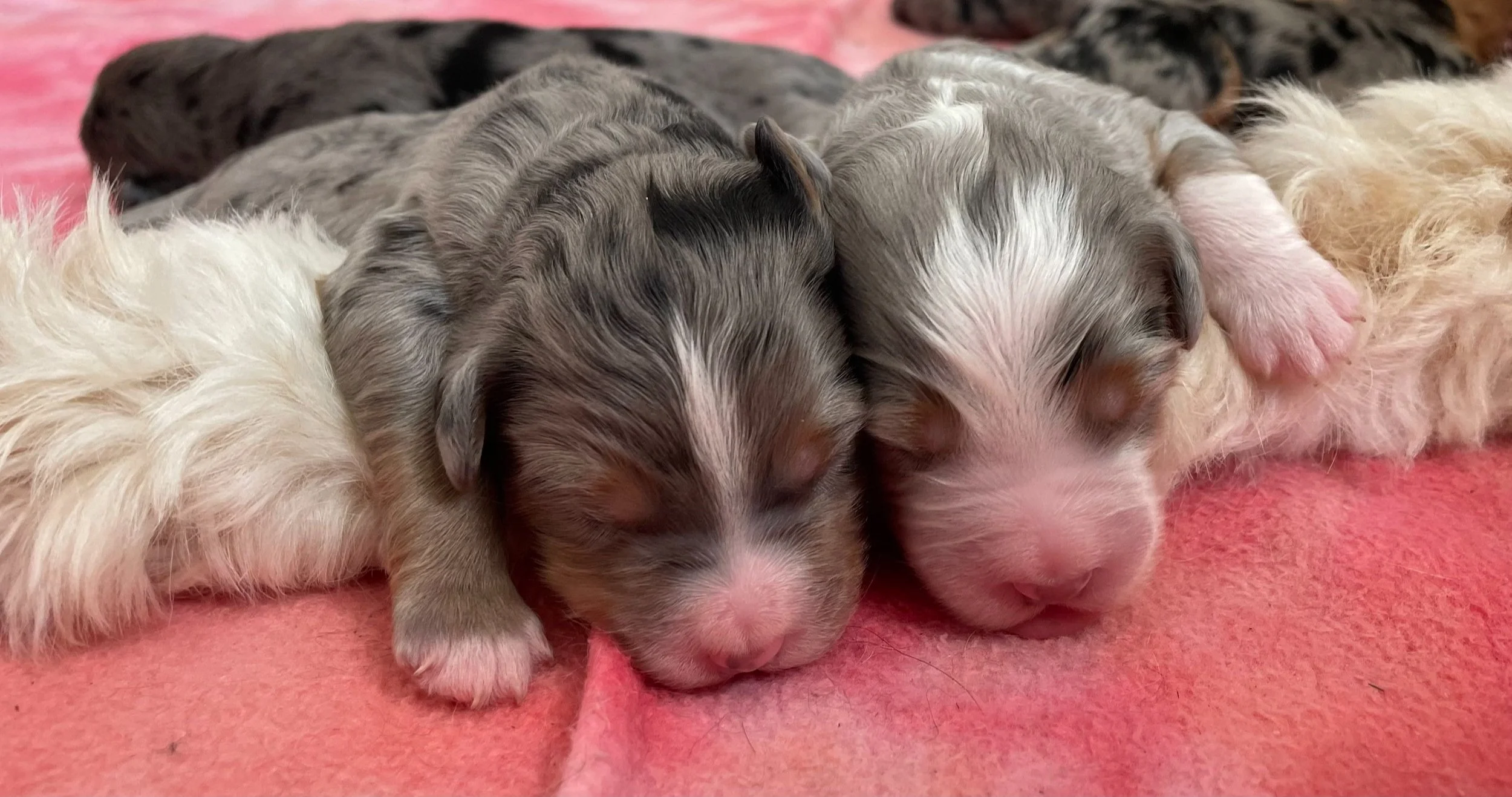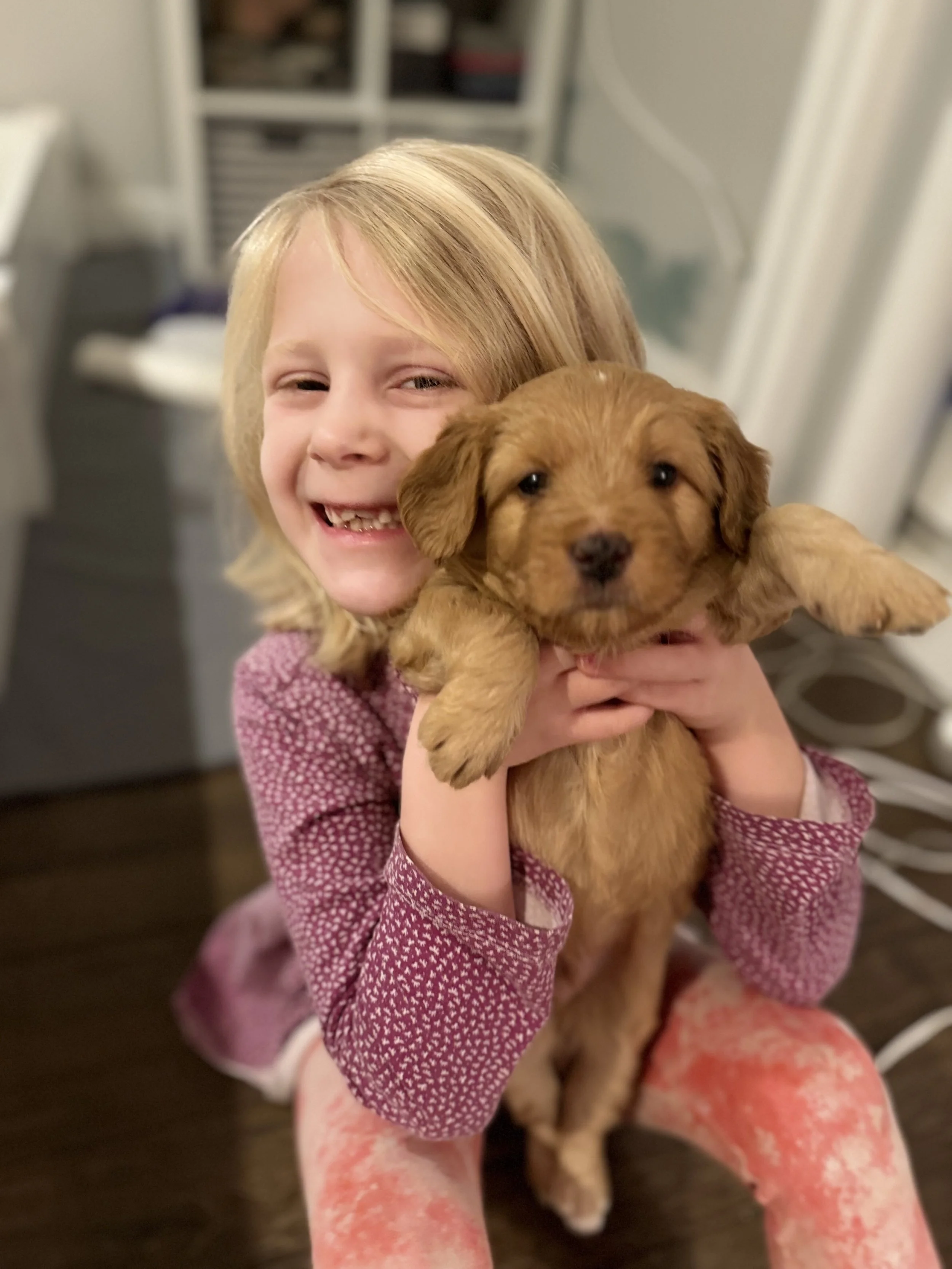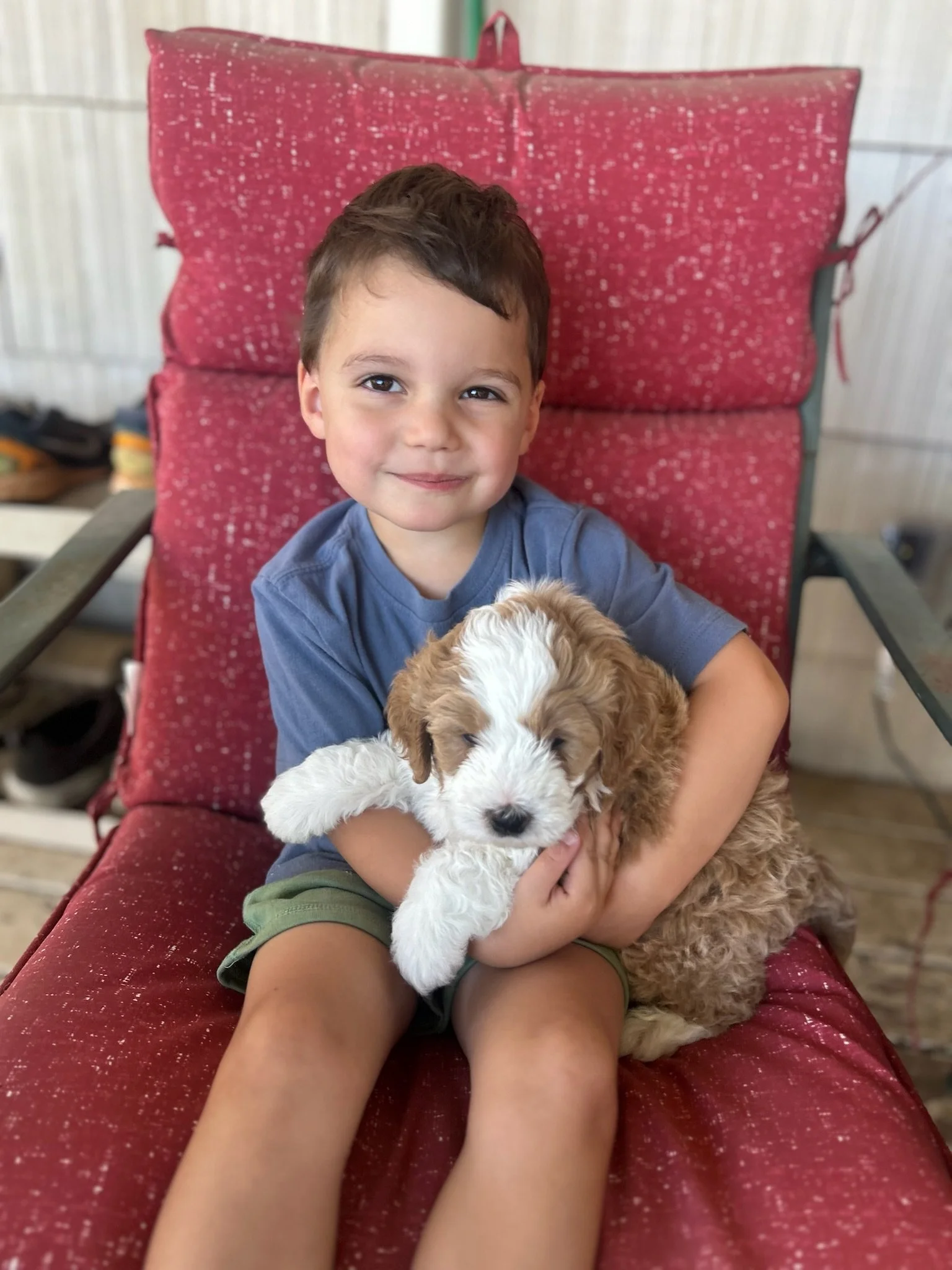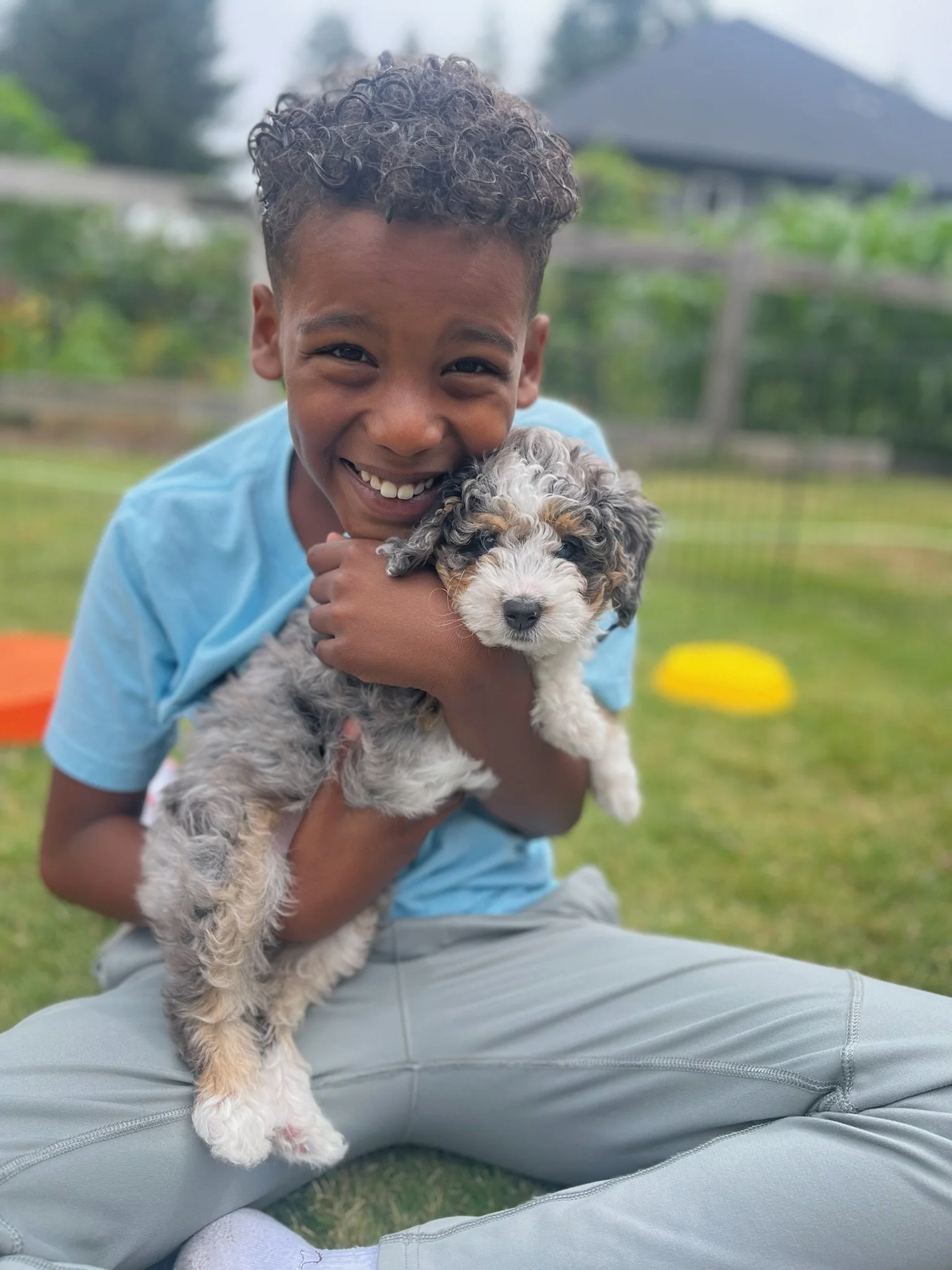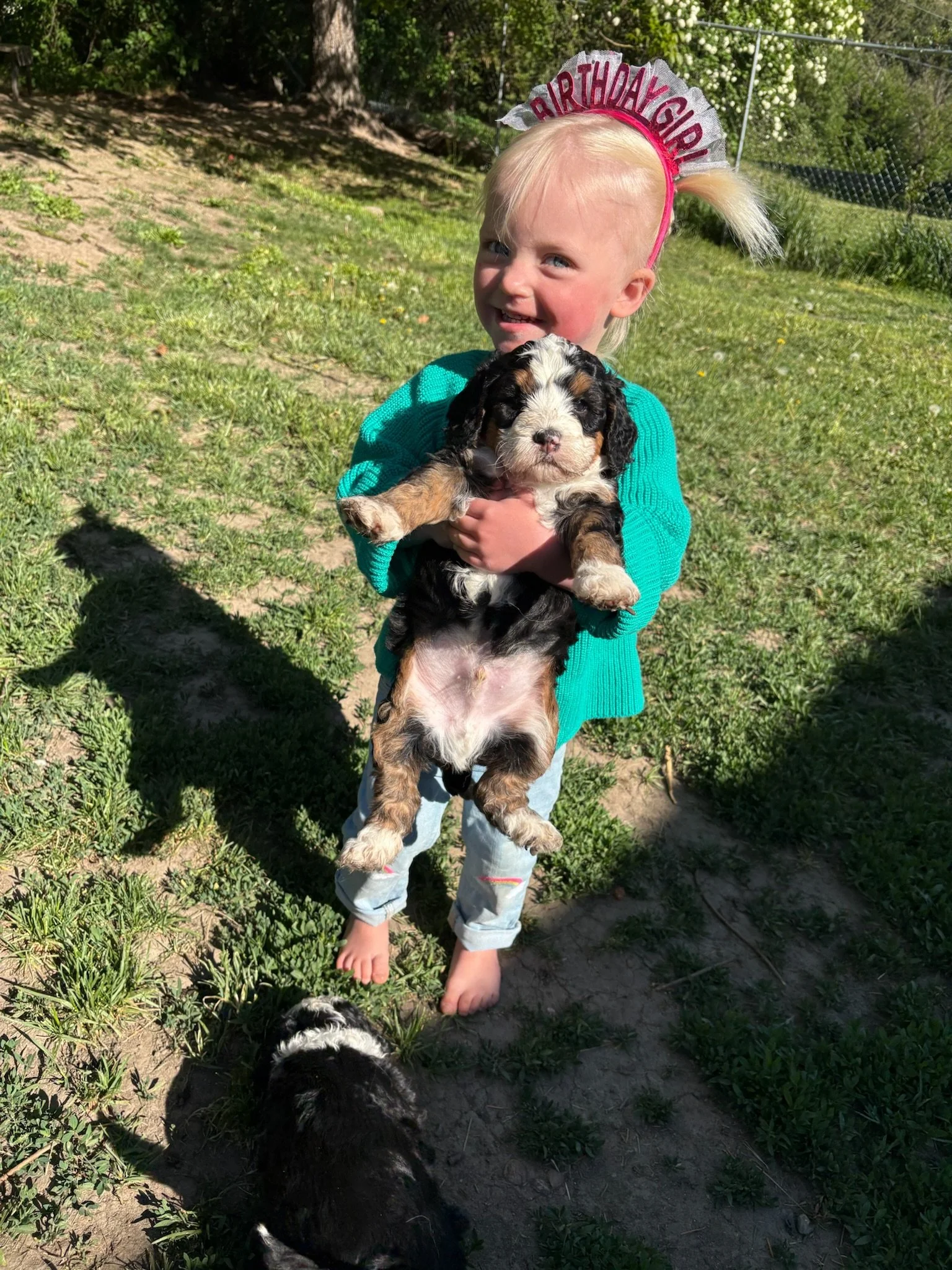What are the phases of a puppy’s development?
When do their eyes open? When can you start training? When do they come home? You’ve got questions, we’ve got answers!
Week 1
First week puppies are adorable little eating machines! Their eyes and ears are closed, their teeth aren’t in and when they’re not sleeping they’re looking for food. They only do 2 things, sleep and eat! They make squeaky little grunting sounds as they search for a spot on mom.
We keep a very close eye on them at this stage because they are so delicate. Some mommy dogs are a little clumsy and can accidentally hurt their babies, so we have someone in the room with the litter 24/7 at this stage. It’s a lot of work but it’s worth it! The first few weeks are critical to the health and well-being of a future adult dog. We’re vigilant about their temperature and their weight, which we carefully track. We’re also very aware of the health of the mom! Breastfeeding isn’t always easy, some moms develop mastitis, and some puppies have a hard time latching on. So the first week can be touch and go for some puppies. We feed our nursing moms fancy home-made food, and give them goat’s milk or baby formula to make sure they get all the nutrients they need.
Week 2
The puppies still can’t walk, but they’re starting to crawl around a bit. They spend most of their time sleeping, and when they’re awake, they’re eating. They love piling up together for warmth and comfort. They’re becoming more robust, but are still very vulnerable.
By the end of week two, the puppies will begin to open their eyes. Their vision will be very limited at first and will continue to develop over the next few weeks. Around this time, their ears will also start to open.
While it’s too early to begin training, we do start gently introducing environmental stimuli and carefully holding and petting them. This early interaction helps them later on—and honestly, they’re just too adorable not to cuddle! Of course, all of this is done under the watchful eye of Mom, who isn’t a big fan of anyone handling her newborn babies.
Week 3
Week three is the final week of what we call “the hamster phase.” Their vision continues to improve, but they still spend all their time sleeping and eating, but this is when they start to play! We can handle them a bit more, and we continue to expose them to the sights sounds of a busy household, which will help their temperament later on. We introduce toys and our daily exposure items, each day they get a new novelty item in their pen to explore, this helps build their confidence and teach them that new things are fun and not to be feared. They start to walk, and wobble around.. We start their pre-potty training at this age. We establish the nest v potty area. The puppies start to get their teeth at this age and we introduce mush. Our mush is soft puppy food mixed with goats milk or formula, and probiotics.
Week 4
The big change comes around week four, when they start to walk well! This is when socialization really begins, as they discover the joys of playing with their siblings, toys and they even notice us.!
Puppies this age have no fear! They wrestle and play without any concerns, but this will change in a couple of weeks when new things might scare them. We continue our daily exposures, constantly changing out their toys, novelty items, grooming tools the blow dryer, running water and nail grinder. Our kids really start to interact with the puppies, they climb into the puppy box with them and the puppies start to crawl on them and show interest in being held. By 4 weeks almost all the puppies have teeth and Mama is starting to wean. They are eating 4 big meals of mush each day and their nursing sessions are down to about 5-6x per day and usually just once at night.
Week 5
By now Mama is down to nursing 2-3x per day, she really is more interested in eating their leftover puppy food than nursing. All puppies have teeth by now. They are almost fully peepad trained and keeping their sleeping and potty areas clean, even at night!
Puppies this age love being held and played with, they all come running anytime they see us. At this age we start to take puppies out of the puppy pen and carry them around the house to expose them to new sights and sounds. We also take them outside for the first time. We set up 3-4 different areas in the house so puppies can spend time in new areas, and in smaller groups. We start teaching our puppies to sit for attention at this age too, only picking them up when they are sitting calmly. We introduce crates, with the doors off and puppies start to want to sleep in them. We continue with our daily exposure items and add in noisy things like the vacuum, lawn mower, coffee grinder etc.
Week 6
The puppies are confident, cuddly and full of spunk! We continue on with our daily exposures to novelty items and sounds. We start our car rides and stroller rides. We head to the vet for a well puppy visit. We take them out individually or in pairs so they get more 1:1 time. We carry pups in slings for walks in the neighborhood or outings. This gives the puppies a chance to see things and socialize but stay safe from harmful germs. We do full baths and blow drys at this age. We get them outside (weather permitting) 3-4x per day. The puppies are fully immersed in family life at this age and often found playing dress up with the kids, sitting on a teens lap while they game or do homework or cuddling up on the couch for a family moving night.
Week 7
Puppies are only a week away from joining their families! They still love wrestling and playing with each other but are starting to fight over toys and attention. They tend to want to sleep in their own space v cuddled up with a littermate. They’re extremely human focused and want to be with us all the time. They want the attention from us more than each other. They are confident and cuddly and so affectionate. We continue all the activities and exposures we do in week 6 and try to give them as much individual attention as possible. We use a lot of positive reinforcement at this age and always have treats on us to reward good behavior.
Week 8
Puppies are ready for homes! All of the exposures and training has paid off and the puppies are ready to join their families. They are highly socialized, confident and very prepared for family life! It’s time for families to begin house training, night time crate training and basic obedience. Puppies should have supervised play time and outdoor time. They will need constant re-directing and appropriate chew toys. Expect frequent naps and occasional bursts of energy. It’s important to continue to socialize your puppy with new people, animals and environments. But remember your puppy is not fully vaccinated so make sure to keep their 4 paws off the ground anywhere but your home and yard until vaccines are complete!
Ready to get started?
Fill out an application, leave a deposit and get on the list today!



